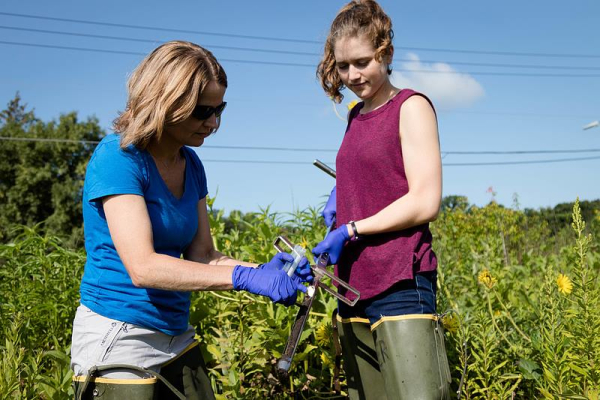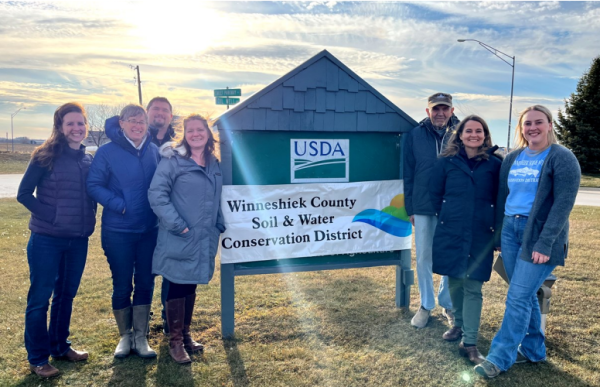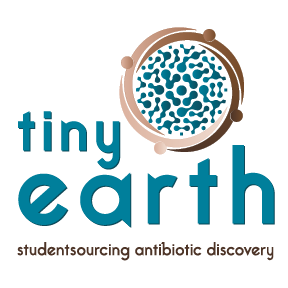Tiny Earth Partner Instructor (TEPI) Dr. Jodi Enos-Berlage, a distinguished Biology Professor and researcher at Luther College in Decorah, Iowa, dedicates her career to investigating and addressing social and environmental issues in soil science and beyond. Leveraging her background in microbiology, Dr. Enos-Berlage also uses her unique upbringing immersed in agriculture—and its related inequities—to increase community awareness and involvement. Through her work, she aims to uplift those adversely affected by soil degradation while highlighting the power of scientific research.

Dr. Enos-Berlage conducting fieldwork with former student and current Tiny Earth Chemistry Hub Manager, Martel DenHartog.
Growing up on a farm in small-town Illinois, Dr. Enos-Berlage was surrounded by nature and agriculture her whole life. Her childhood residence was isolated and immersed in nature, which gave her and her siblings incredible range and freedom to explore. Memorable childhood experiences on the farm led her to an interest in biology and agriculture. With a personal connection to biological sciences, she majored in Microbiology as an undergraduate at the University of Illinois in Urbana-Champaign. After, she received her Ph.D. in Bacteriology at the University of Wisconsin-Madison. As a postdoc, she studied the metabolic pathways in Salmonella typhimurium with Dr. Diana Down at UW-Madison. Later she focused her research on Vibrio parahaemolyticus biofilm development at the University of Iowa, where she analyzed the bacterium’s motility and sensorial decision-making versatility on specific surfaces. She continues to research V. parahaemolyticuson at Luther College. Her research interests have expanded to include water quality research at Dry Run Creek, a 20,000-acre watershed mostly used for agriculture. Through this endeavor, Dr. Enos-Berlage realized that the farm she managed with her family was located near Dry Run and she may have unknowingly contributed to its pollution. Since 2010, the creek has consistently been monitored for different chemicals and macroinvertebrates thanks to this project.
Dr. Enos-Berlage’s work with Dry Run Creek was pivotal in bringing her attention to the inequities in the agriculuture, particularly the underrepresentation of women farmers. Shortly after her work at the watershed began, she received a grant to collaborate with local farmers on water quality research. As she set out recruiting farmers to provide funding to, Dr. Enos-Berlage found that women landowners are not commonly named in Iowa’s plat books—maps that display the ownership of land plots in a county. When investigating, she discovered that 95% of landowners listed in the plat books were men. In cases of dual or multiple ownership, men’s names were typically listed first on the deed, leaving women owners’ names often undisclosed. Dr. Enos-Berlage was shocked to find that even she and her mother, who are landowners, were not listed in the county plat book. After this realization, she became even more dedicated to increasing awareness about inequities, particularly gender inequities, in agricultural domains.
“The combination of our farming and the watershed, me doing water quality work, partly driven by the connection with agriculture, living those inequities, and then seeing them in my historical background were key drivers for my interest in this topic.” —Dr. Jodi Enos-Berlage

Dr. Enos-Berlage (second to the right) with Regenerating Soil and Community (RSC) collaborators.
Dr. Enos-Berlage has recently been involved in the planning of projects that incorporate her various interests. Through grant funding from the U.S. Environmental Protection Agency and the Department of Natural Resources, Dr. Enos-Berlage and her colleagues hope to decrease inequities faced by underserved farmers. The Regenerating Soil and Community (RSC) Grant, “will use innovative approaches to build knowledge, confidence, community, and conservation plans for landowners and farmers that have been historically underserved by Federal programs and policies.” The RSC team is an unusual combination of people, including Dr. Enos-Berlage, 4 other science faculty, a dance professor, and an associate director of the career center at Luther College, along with members of local agriculture and farming groups. Dr. Enos-Berlage underscores the AJEDI (Antiracism, Justice, Equity, Diversity, Inclusion) values promoted by Tiny Earth as well as Tiny Earth founder Dr. Jo Handelsman’s work highlighting the soil crisis and gender inequities in STEM as major influences on her understanding of inequities and how to acknowledge them.
“Tiny Earth’s emphasis on AJEDI values further elevated the importance of addressing this gender inequity in agriculture and land ownership.” —Dr. Jodi Enos-Berlage
The RSC team’s unconventional, interdisciplinary, and diverse membership makes them well-rounded and able to address several facets of the soil degradation in Iowa. Listening sessions that identify needs, individual soil assessments, and showcasing science laboratoraties are only a few of the grant practices that have unified farmers, scientists, and artists in the area. Through workshops, the project aims to build confidence and community in agriculture and science. The grant operates on the belief that healthy soil microbes lead to clean water and abundant food, naturally resulting in healthy humans and a healthy planet. One of the activities funded by the grant, called “Soul of Soil”, is an immersive dance performance and field experiment that will be performed at the Luther College’s Center for the Arts Jewel Theatre on May 2, 3, and 4 at 7:30 PM CT. The performance will include faculty, students, and even women landowners and address the importance of soil health.
Congratulations and thank you to Dr. Jodi Enos-Berlage for the incredible work in Iowa, Tiny Earth, and beyond!
Written by: Melis Baskaya, Tiny Earth Communications and Media Intern
Edited by: Trang Tran, Tiny Earth Outreach Specialist

